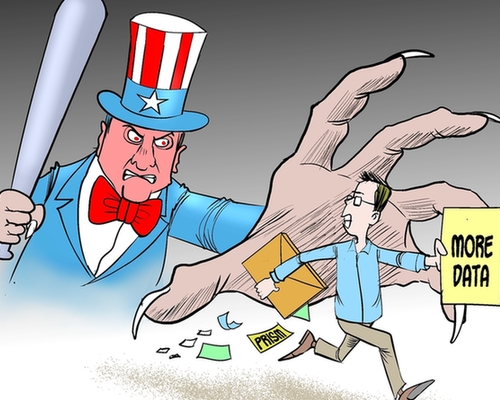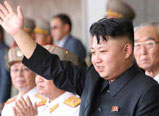
 |
| Face off [By Jiao Haiyang/China.org.cn] |
In Aesop's fable about the wolf and the lamb, the wolf wants to eat the lamb yet does not want to convey an unreasonable or greedy self-image. Keeping this in the back of its head, the wolf invents a series of excuses ranging from "you muddle the water from which I am drinking," to "you insulted me last year" and "you feed on my pasture." Nonetheless, the lamb is able to refute every single one of these accusations. These refutations range from "I cannot be the cause for the water being muddy because it runs down from you to me" to "I have not yet tasted grass." The wolf gobbles up the lamb anyway. The moral of this story? A tyrant will use any excuse to do evil.
To the larger Chinese public, the U.S.-China row over cyber security and whistleblower Edward Snowden seemingly reproduces the narratives contained in the fable.
On the American side, Google accused the Chinese government of accessing "the accounts of dozens of U.S.-, China- and Europe-based Gmail users" and with that left the Chinese market. Former Secretary of State Hillary Clinton warned against the risks of investing in "countries with aggressive censorship and surveillance policies." American information security firm Mandiant reported that "140 companies have been hacked … and hacking groups from China were responsible for most of the attacks." American Attorney General Eric Holder announced a plan to "fight the quickly growing threat from cyber spies." National Security Advisor Thomas Donilon was concerned about "cyber intrusions emanating from China on an unprecedented scale" and warned that "the international community cannot afford to tolerate such activity from any country." Finally then, President Obama pushed the hard ball game to new heights by charging the Chinese government with endorsing espionage activities, and consequently called for U.S. Congress to take action in "protecting people's privacy and civil liberties."
From the Chinese side then, some claimed that the U.S. wolf controlled most of the world's Internet resources and was unreasonable in voicing such allegations against the Chinese lamb. Moreover, China said that China itself was in fact the most vulnerable target and biggest victim of hacking activities emanating from the U.S. Former Foreign Minister Yang Jiechi responded that "the Chinese government opposes hacking activities," "anyone who tries to fabricate or piece together a sensational story to serve their political motives will not be able to blacken the name of others or whitewash oneself," and "what cyber space needs is not war, but rules and cooperation." Newly installed Prime Minster Li Keqiang simply dismissed American accusations as being a "presumption of guilt." Chinese President Xi Jinping called for "conducting good-faith cooperation" as to "remove misgivings and make information security and cyber security a positive area of cooperation between China and the U.S."

















 Working under 40 degrees Celsius
Working under 40 degrees Celsius


![]()
